How a concert promoter turned her love for lowriders into L.A.'s most original new venue
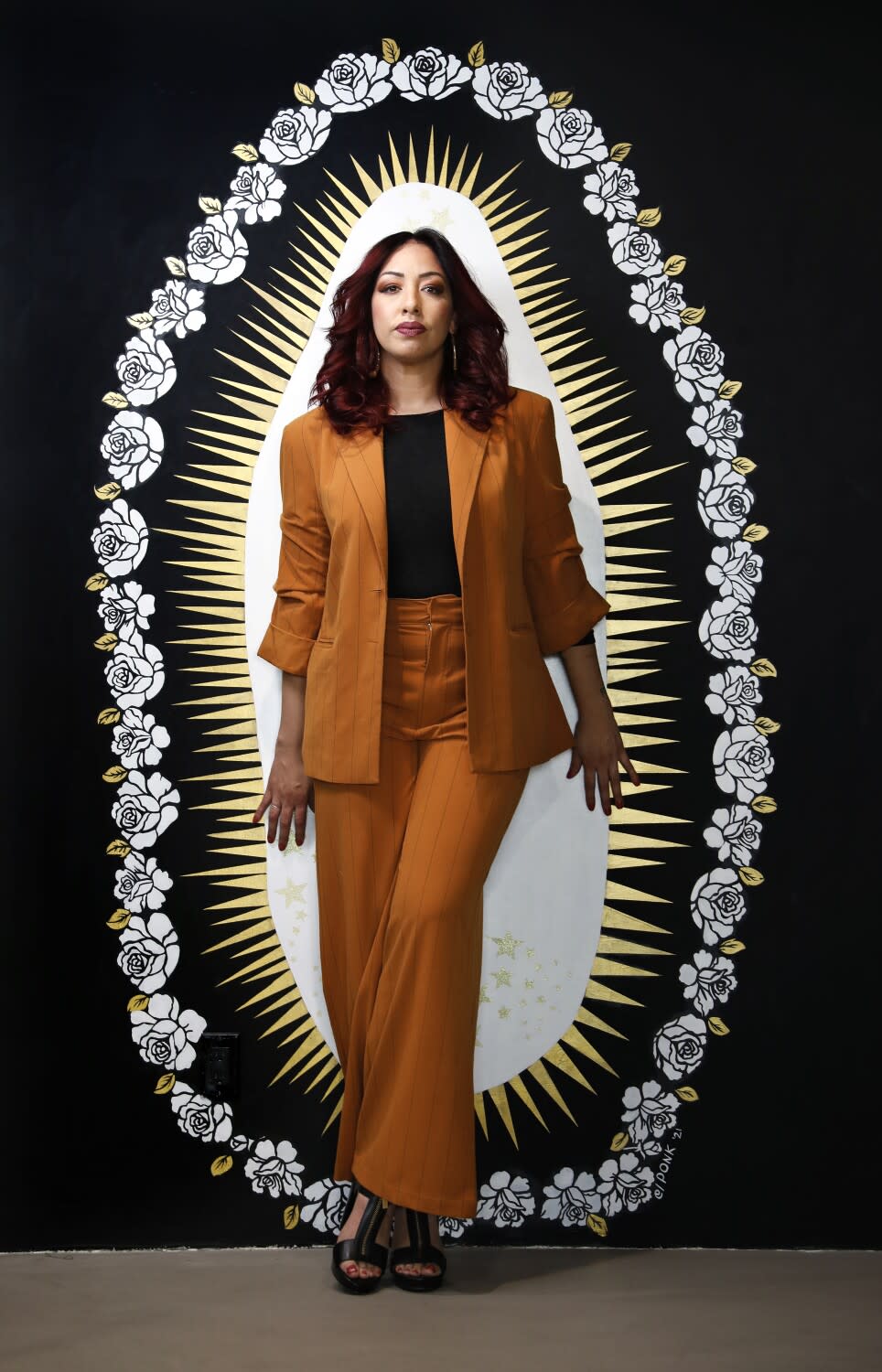
- Oops!Something went wrong.Please try again later.
Strutting past the concrete floors and charcoal-colored walls of her soon-to-be music venue, Angela Romero breaks into song. “Diamond in the back, sunroof top / Diggin’ the scene with a gangster lean,” she croons, reciting the William DeVaughn lyrics — a reference to pimpmobiles — that inspired the diamond-shaped window she installed in a kitchen door.
Nearly every inch of Hello Stranger, Romero’s soon-to-open bar, restaurant and music venue similarly pays respect to lowrider car culture and the oldies soundtrack that bumps alongside it. There’s a corner booth dubbed “Stay in My Corner” after the 1965 ballad by the Dells and a window installation inspired by the 1981 Teena Marie hit “Square Biz.” A sign in front of the men’s restroom reads “Mr. Big Stuff,” evoking the 1971 singalong by Jean Knight. (It’s also the title of a music event Romero organized years ago as a form of catharsis after finding out her then-boyfriend cheated on her.)
Even the bar’s name, Hello Stranger, was plucked from a verse in the Barbara Lewis doo-wop hit released nearly two decades before Romero was born. With lyrics like “It seems so good to see you back again” — printed in Old English font on Hello Stranger’s merchandise — the song is a throwback and a weirdly fitting anthem for a time marked by quarantines, closures and reunions. “I always said that [the phrase] ‘hello stranger’ was like a handshake without the handshake,” says Romero, 40, who wears silver hoop earrings and has a shock of dyed wavy hair the color of Flamin’ Hot Cheetos. “So when COVID came, I was like, it makes more sense now, you know?”
When the venue opens later this month, after years of pandemic-related delays, a messy trademark lawsuit and a series of personal tragedies, Romero hopes it feels like a return — not just to a time before COVID but to a previous era, when people “had enough respect to put on suits to go out.”
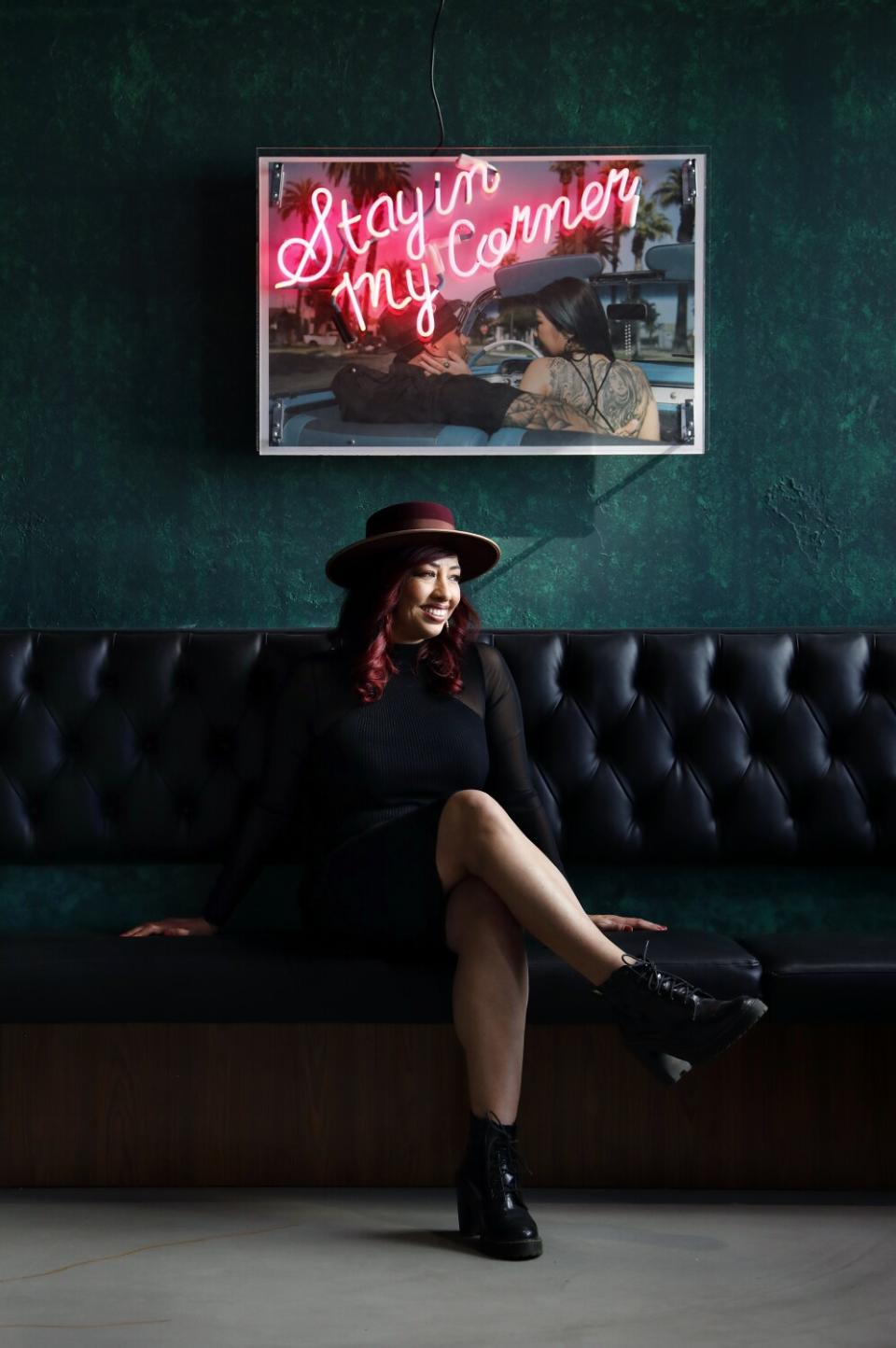
Taking over the second floor of a building on Little Tokyo’s 2nd Street, Hello Stranger is the physical iteration of Romero’s concert promotion business, catering and cocktail program, and, more recently, nonprofit foundation of the same name. The brand dates back to 2017, when Romero began selling Hello Stranger-emblazoned T-shirts, sweatshirts and “shop rags” — a must for mechanics — at car shows like Mooneyes and music festivals including Punk Rock Bowling. It hosted its first music event — an RSVP-only pop-up at a loft near Chinatown — the following year, surprising an intimate crowd with performances by Grammy-nominated R&B singer Aloe Blacc, oldies legend Rocky Padilla and members of the Delfonics and War.
“There was such a FOMO after that. Everyone was like, ‘Who the hell are you? What are you doing? It’s just you, girl?’” says Romero, who can talk uninterrupted for hours, occasionally weaving in Spanish and Spanglish. “From there, the brand started growing, and I made sure that all those people who did show up were on the next invite list … that to me was the best way to cultivate family naturally.”
Since then, Hello Stranger has booked everything from musical acts at festivals to chefs and bartenders at curated food events. Romero’s philosophy? “Pay respect to the OGs that really created that style, but showcase the new voices who looked up to the OGs.”
The venue itself does just that, blending old-fashioned staples with of-the-moment trends. Its midcentury-inspired supper club eschews American comfort food for Oaxacan street food. The stage might feature an octogenarian jazz band one night and a Twitter-famous stand-up comic the next. And while the vibe is unapologetically pre-cellphone era, it also boasts Instagram-friendly murals including an outline of the Virgin of Guadalupe near the entrance.
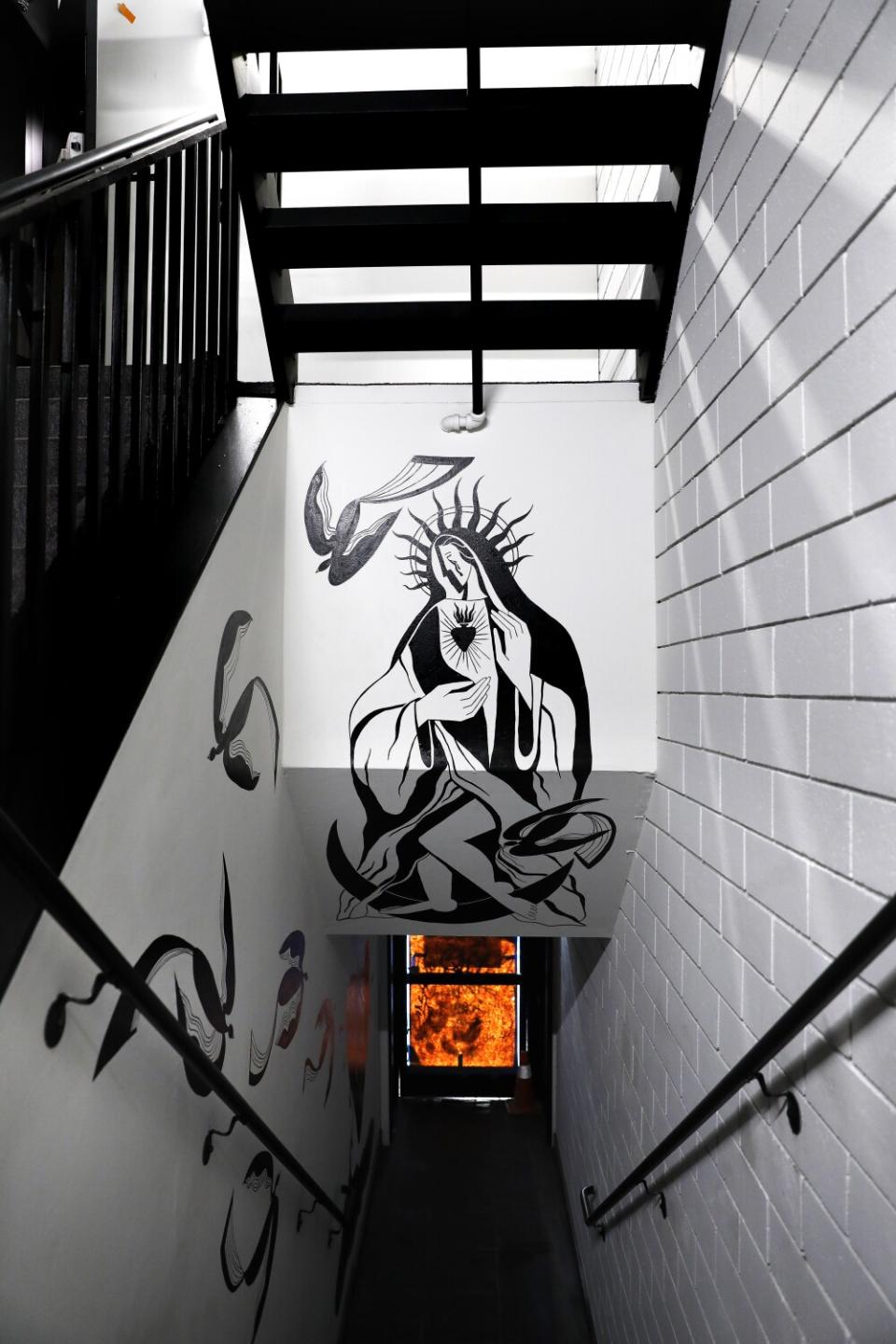
Steering clear of the machismo that sometimes characterizes the lowrider scene, Hello Stranger instead highlights work by women artists. A neon piece by Venice-based artist Tory DiPietro illuminates the words “Sweet thing” — a nod to the Rufus song featuring Chaka Khan — in pink light on the back wall of the space. Romero has asked her aunt, El Sereno artist Ester Petschar — she memorably appeared in last year’s Netflix docuseries "Night Stalker: The Hunt for a Serial Killer" — to paint a mural near the entrance. And the venue’s centerpiece, a glittery pink bar top with painted roses, was designed by the artist Elrod (born Leanne Rodriguez) to evoke Gypsy Rose, a legendary Chevy Impala lowrider.
“The music industry, the bar world, it’s just all a man’s game,” says Romero. “I want people to know that a female opened this space.”
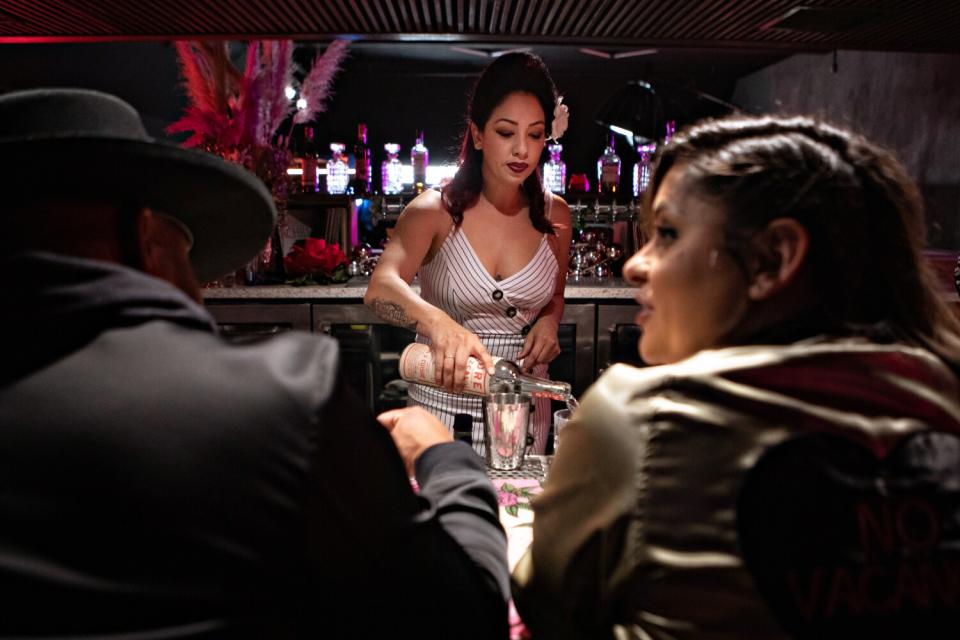
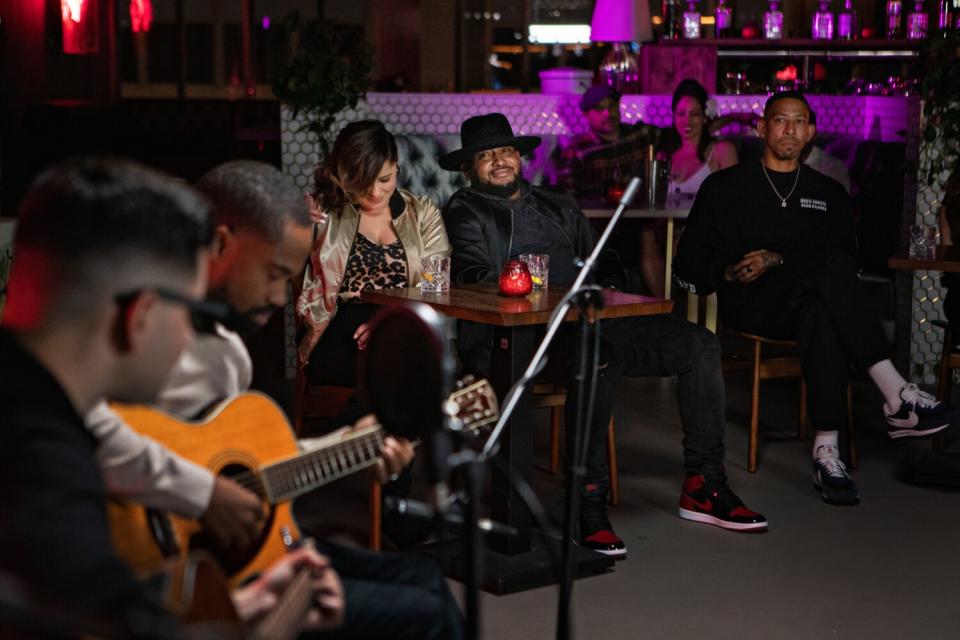
The other thing Romero wants people to know about this space: It’s a tribute to L.A.’s Black, Mexican and Japanese cultures. Citing the robust lowrider scene in Japan, Romero says, “They really love and embrace Chicano culture to the point where they live it. And I mean, Chicano culture doesn’t necessarily mean that people are Mexican.”
Design elements within the venue pay homage to a mix of L.A. cultures. A floor crack filled with gold paint is a subtle nod to the Japanese wabi-sabi philosophy of drawing attention to imperfections. Nearby, three black dots painted on the floor represent the idea of mi vida loca, popular in Chicano tattoo culture. (Romero and her mom have it tattooed on their wrists; above Romero’s dots is the word firme, Spanish for strength.) “Normally it’s associated with gangs, but for the most part, it is also just an embodiment of one’s culture,” not unlike a “pachuco cross,” which is also painted on the ground, Romero says.
In line with its melding of Japanese and Mexican cultures, last May, Hello Stranger launched Oishi Barrio, a monthly open-air market that translates roughly to “delicious neighborhood” in Japanese and Spanish, respectively. The events, which ran from spring through fall at the Japanese American Cultural & Community Center, featured DJs such as Ruben Molina of the Southern Soul Spinners, food pop-ups like Tacocidal Tendencies and retail vendors including Mi Vida.
“I really like that she made a point to do that,” says Mayra Ramirez, one of the DJs of all-female collective Chulita Vinyl Club who has worked with Romero at Hello Stranger. “And also just bring a lot of other people that normally wouldn’t be hanging out in Little Tokyo on a Sunday afternoon.”
Just a few months after Oishi Barrio launched, Hello Stranger held its biggest event yet: a two-day festival dubbed Hit the Switches (the name is a slang reference to activating hydraulics on a lowrider). Hosted at Santa Anita Park in August, the event featured a car show, roller rink and performances by L.A. funk and soul artists including Dâm-Funk, XL Middleton, the Altons and the DJ and rapper Arabian Prince, formerly of N.W.A.
“[Romero] is one of only a handful of promoters I’ve worked with in my 40 years of doing this that really impressed me, from the way she treated all her artists to the hand-picked artists who performed,” the DJ and producer Egyptian Lover, a.k.a. Greg Broussard, said about his experience headlining the festival.
Broussard traces the origins of his musical interests back to the lowriders he and his friends saw growing up in South Central. “Cruising down Crenshaw and Hollywood Boulevard gave us the mixed cultural music scene we needed,” he said. “From oldies but goodies to hip-hop to soul to funk to old school — hearing the music and watching the cars was our entertainment.”
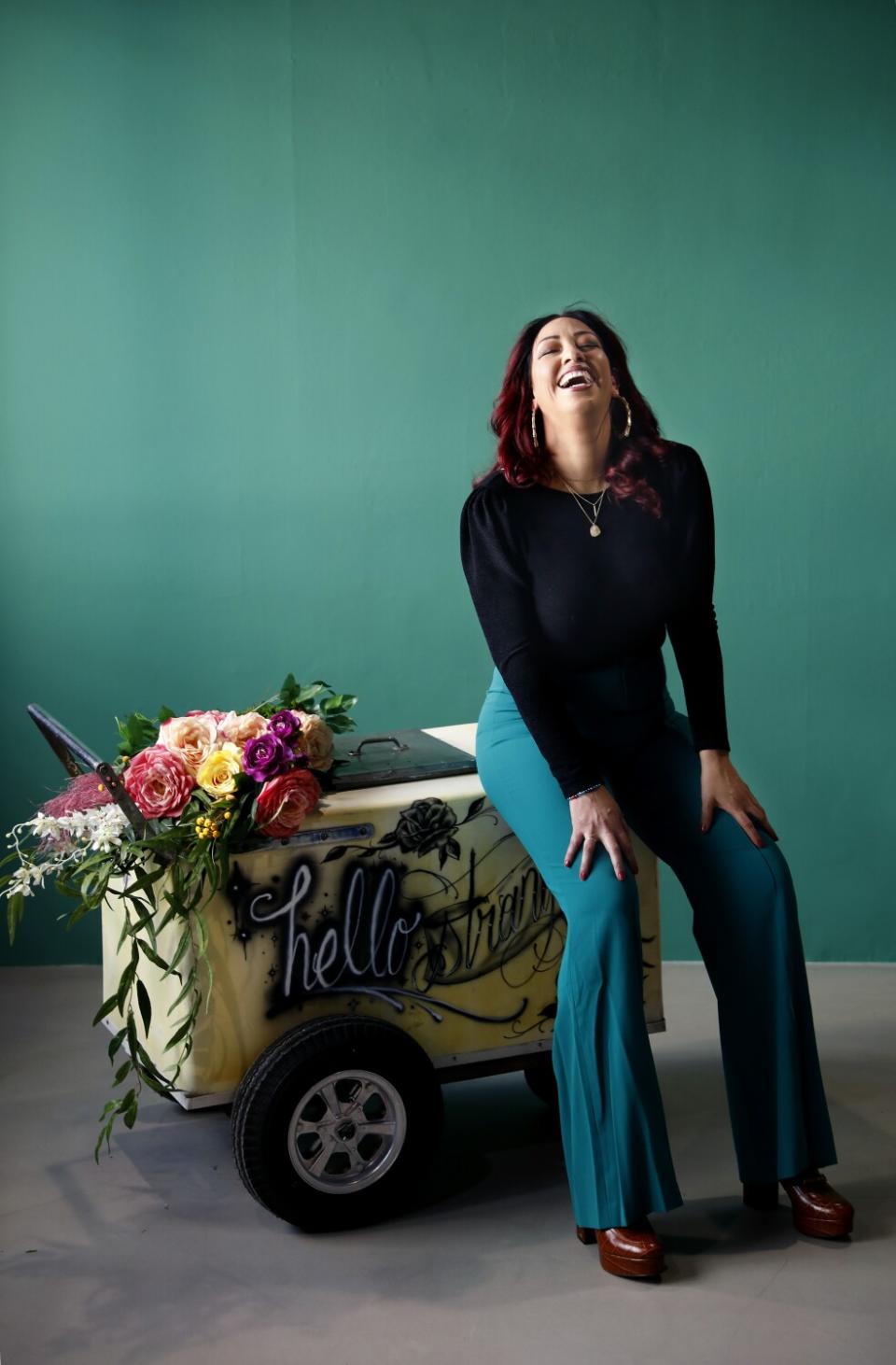
Growing up in El Sereno, Romero was practically born into the lowrider scene: Her oldest brother, Michael, whose untimely death inspired Romero to create Hello Stranger, was known for throwing concerts and classic car shows around town. Michael was 15 years older than Angela, but he had an outsize influence on her. “Angela is the spitting image of her brother. They’re two peas in a pod,” says Angela’s mother, Caroline, who was born near Boyle Heights and raised seven children — including her youngest, twins Angela and Audrey — in the same house where she still lives today.
Still, Romero struggled to square the person she admired with the person who served time for assault and battery charges when she was still a kid, in the mid-’80s and early ’90s. “I never gave him passes for being the person he was back in the day,” says Romero. “But it took me a while to realize we are all human, and people make mistakes ... how do we learn from those lessons?”
When a bullet to his neck left Michael paralyzed, Angela became his caregiver, becoming “his hands and feet” while helping to run his concert promotion business. “I don’t want to say I was forced into helping him promote his shows, but that’s really where I learned it from,” she says.
Michael eventually joined a Christian ministry and dedicated his life to community service, incorporating charity elements into his car shows and concerts. His “volunteer efforts on behalf of the neighborhood” led to his being named honorary mayor of El Sereno, according to a 2001 Times article.
By that point, he’d survived more than a few near-death experiences, including a stabbing near his heart, earning him a reputation for having nine lives. One such incident, in which a government vehicle backed into him in his wheelchair, left the already-paralyzed Michael with shattered bones from his ribs to his ankles, according to Romero.
His ensuing 2008 lawsuit against the city of L.A. and the California Department of Transportation resulted in an undisclosed settlement, court records show. A year later, another tragedy hit: Michael’s 17-year-old son was gunned down while riding his bicycle near their San Bernardino home.
“Both of them were shot [during their lifetimes]. My brother survived but became paralyzed; his son didn’t make it,” says Romero, reflecting on “the amount of tragedy and death that just seems so normal when you grow up in certain areas of the hood.”
When Michael passed away from complications due to pneumonia in 2014, Romero opted for a concert rather than a funeral, calling on Michael’s longtime friends and clients — juggernauts of the oldies scene — to celebrate his life: Brenton Wood, Rocky Padilla and members of the Temptations, the Delfonics and the Notations.
Michael’s death devastated Romero. It also brought her an unexpected windfall: Michael had left her his estate. Romero won’t comment on the amount of money she inherited but suggests it was substantial enough to be life-altering — for better or worse. “Everyone felt the need to say why they felt I should give them something or do something for them,” she recalls. “Even right now, my circle of family that I get to hang out with is very small, my circle of friends is really small.”
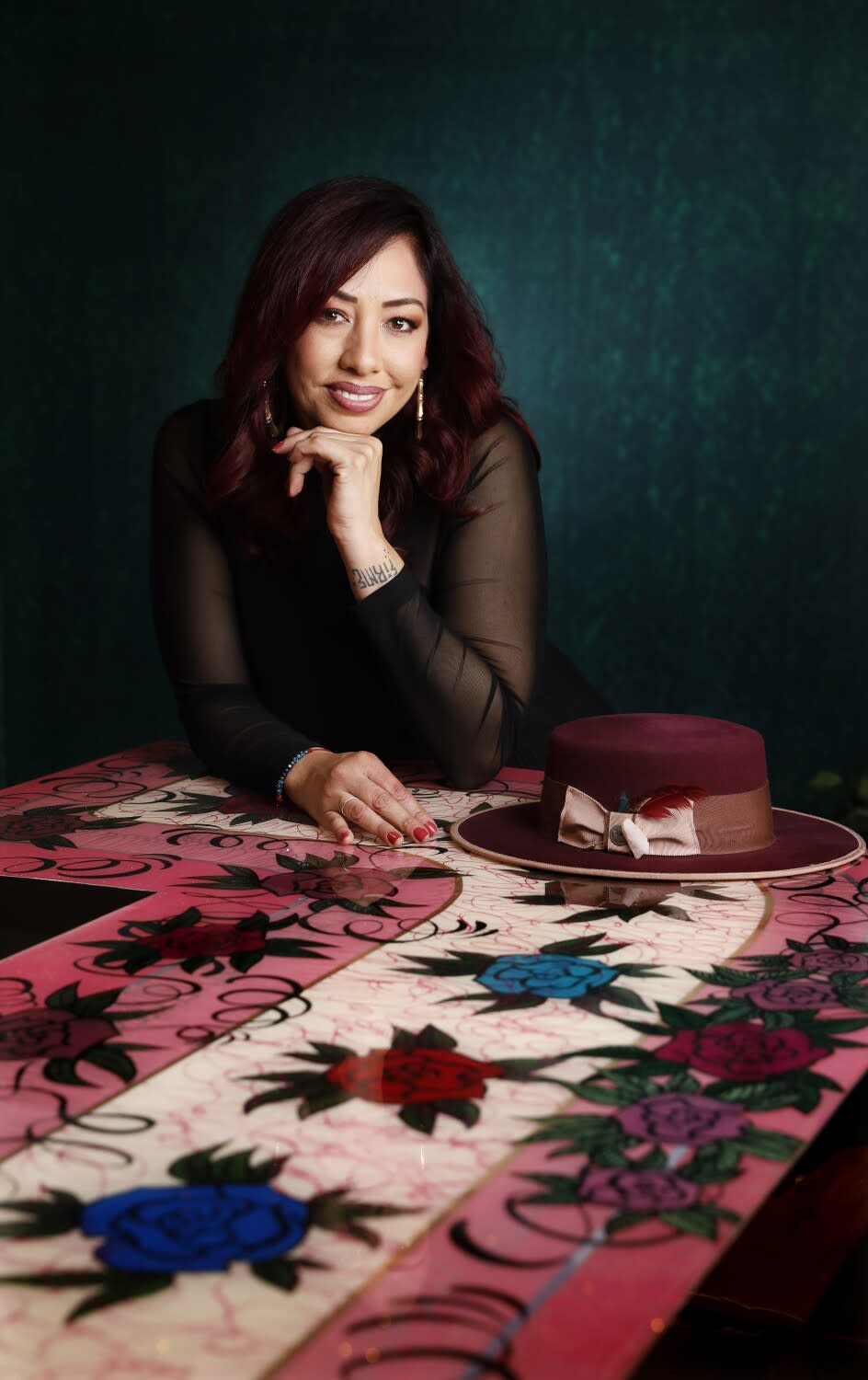
Romero used the inheritance to help kick-start Hello Stranger — a business concept she says she and Michael had always dreamed of doing together. “This is my grief,” she says. “I’m a crybaby. I’m a sad girl. That’s how Hello Stranger was built.”
Still, the long road to opening Hello Stranger has not been easy or straightforward. “You still have to work your ass off to get to this point ... to the point where it was beyond exhausting,” Romero says.
First came the renovations, which proved to be extensive. Then came a triple whammy of legal and personal setbacks: An Oakland bar of the same name sued Hello Stranger for trademark infringement. Romero’s father — then recently divorced after 36 years of marriage — got prostate cancer. And Romero’s relationship with her then-boyfriend was falling apart.
“I was leaving my ex and coming here, and I was just sleeping here. It wasn’t ideal. I truly felt like I didn’t really have anywhere to go,” she says.
By the time the lawsuit was resolved and dismissed in 2019, it seemed like easy cruising. Romero’s father was in remission, and she’d moved into her own place, in Lincoln Heights, following the breakup. Then the pandemic hit, bringing with it even more delays and an entirely new set of obstacles.
Thinking back on her vida loca, Romero has to laugh. “Maybe [having] kids would have been nice, you know, the family, the marriage. But it feels like I’m just married to this, you know? This is my baby,” she says. “It’s creating longevity for the family, and it’s something that I know that [Michael] would have wanted.”
She sits at her shiny pink bar and sips a can of pineapple juice, inventory for the cocktails she’s developing for the menu. “I’m most likely going to be working here every day of my life,” she says. “This is what I do.”
This story originally appeared in Los Angeles Times.

